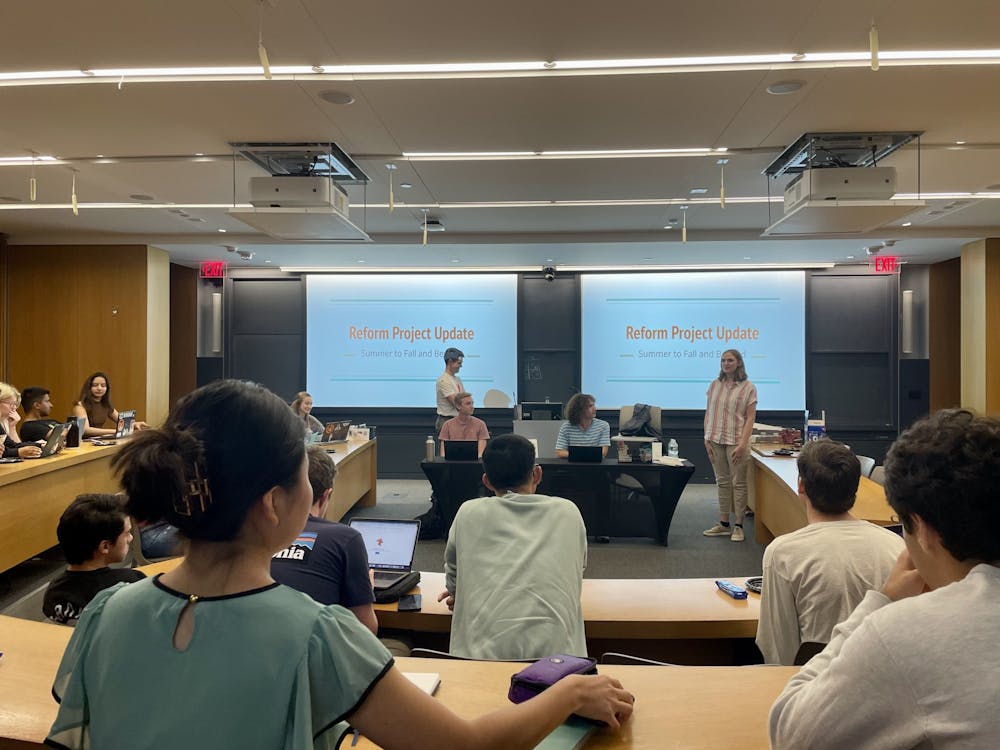In a special Undergraduate Student Government (USG) meeting on Wednesday, Sept. 7, the Senate debated proposals that would require Senators and U-Councilors to serve on USG core committees and reform the office of the Chief Elections Manager. The Senate also voted to confirm several new members.
The proposed changes, which have not yet been voted on, follow continued discussions around USG’s structure.
Last spring, the Chief Elections Manager, Brian Li ’24, was at the center of a controversy related to a referendum that proposed a boycott of Caterpillar machinery. In the wake of this controversy, some in USG have moved to establish a new role, Deputy Elections Manager.
“This [position] was designed mainly to better support the Chief Elections Manager,” Diversity, Equity, and Inclusion (DEI) Chair Braiden Aaronson ’25 said. Aaronson presented the update along with Senator Walker Penfield ’25, U-Councilor Dillion Gallagher ’23, and Campus and Community Affairs (CCA) Chair and reform project leader Isabella Shutt ’24.
Aaronson also noted that the reform would aim to “better streamline the process of succession” for elections managers and to provide “more flexibility” for the Chief Elections Manager to delegate responsibilities.
But the Chief Elections Manager himself does not seem to support the change.
Li, who still serves in the role, was unable to attend the meeting but shared a statement through USG President Mayu Takeuchi ’23. According to Takeuchi, Li “does not think that these proposals are prudent” and believes that they would “create confusion.”
Li further explained that the specifics of the position have yet to be fully determined.
“I personally think that these deliberations should not happen in his absence,” Takeuchi added, “given his experience and out of respect for the work that he's done for our team.”
In response, Gallagher assured the Senate that Li was not “intentionally exclude[d]” and that no one outside of those working on the reform project was directly consulted about the proposals so as to avoid conflicts of interest.
“The project's approach to immediate implementation may not be appropriate,” USG Vice President Hannah Kapoor ’23 asserted before wrapping up the discussion.
The other proposed reform would “[mandate] that all Senators and U-Councilors serve on a Core Committee unless exempted by the Executive Committee.” The recommendation responds to concerns that core committees within USG can become disconnected when voting members of the Senate aren’t a part of them.

Presenters also noted in their slideshow that “[c]lass senators and U-Councilors historically have not served on committees, making it difficult for their constituencies to be represented in issue-specific policy work.” The USG Constitution overrides any standing rule like this one, so committee chairs would still have ultimate control over the members of their committees.
The Senate also heard speeches from candidates for U-Council Chair who were nominated on the spot as part of an internal USG election, including U-Councilor Stephen Daniels ’24 (nominated by Shutt), U-Councilor Daniel Shaw ’25 (self-nominated), and Gallagher (nominated by University Student Life Committee Chair Avi Attar ’25). Former U-Councilor Chair Riley Martinez ’23 was also nominated by Shaw but declined to run.
U-Council Chairs are tasked with representing the Senate in monthly Council of the Princeton University Community (CPUC) meetings.
Shaw discussed the importance of student voices and coordination between various campus groups on issues such as “due process” in disciplinary reform.
Gallagher emphasized the importance of taking “a more assertive stance” in conversations with University administration, especially with regard to mental health. “[As a first-generation student], I understand exactly what Princeton can give,” Gallagher said, “and I also think that Princeton can do more.”
Daniels echoed calls for USG to be “more aggressive” with policies and programs, and noted that while working on projects relating to community dining and mental health resources, he has been able to build relationships and better understand how best to “engage” with “stakeholders” within the University.
The Senate voted to enter a closed executive session — excluding community members and reporters — to deliberate which two candidates to select as U-Council Chairs, but no final decision could be officially announced by the end of the meeting because of a requirement that results be reviewed by the Parliamentarian and the Chief Elections Manager.
Senate members also voted to confirm a number of new appointees: U-Councilor Uma Fox ’26, Parliamentarian Sebastian Mehrzad ’26, U-Councilor Med Coulibaly ’25, U-Councilor Judah Guggenheim ’25, Elections Manager Alex Sorgini ’26, Senator Ellen Battaglia ’23, Gallagher, and U-Councilor Aishwarya Swamidurai ’26.
Mehrzad and Sorgini will each spend time working with the current Parliamentarian and Chief Elections Manager, respectively. Battaglia replaces Senator Kanishkh Kanodia ’23, who stepped down ahead of this semester.
Gallagher chose to relinquish his role as Chief of Staff in favor of serving a U-Councilor, in order to maximize the amount of time he can spend working on USG projects prior to his graduation — his Chief of Staff term would have ended this winter, while the full-year U-Councilor term allows him to work through the spring.
USG Senate meetings are typically held in Betts Auditorium in the School of Architecture at 4 p.m. on Sunday afternoons and are open to all.
Annie Rupertus is a sophomore from Philadelphia and a News staff writer who covers USG for the ‘Prince.’ She can be reached at arupertus@princeton.edu or @annierupertus on Instagram and Twitter.








